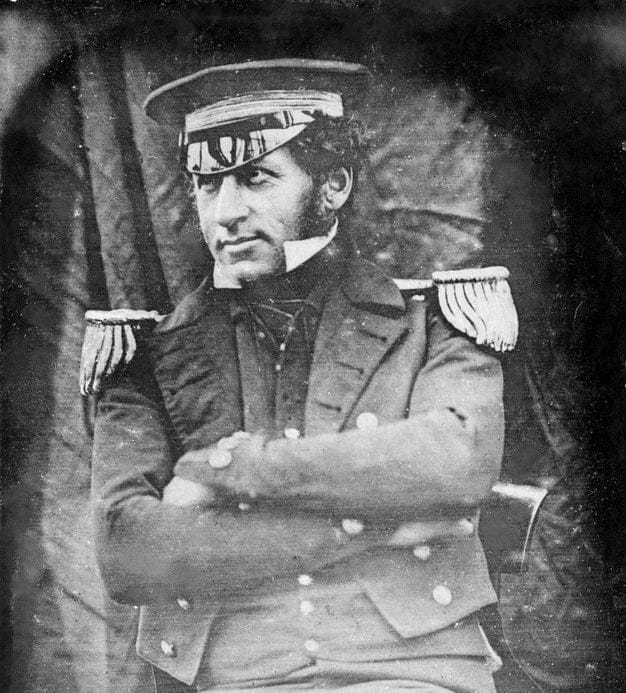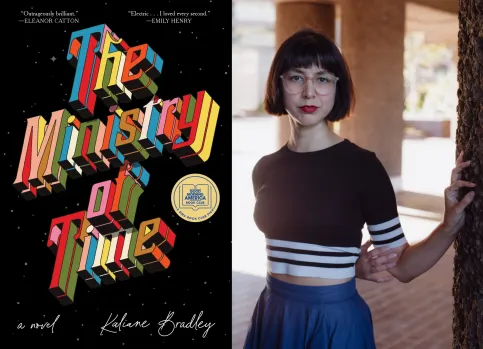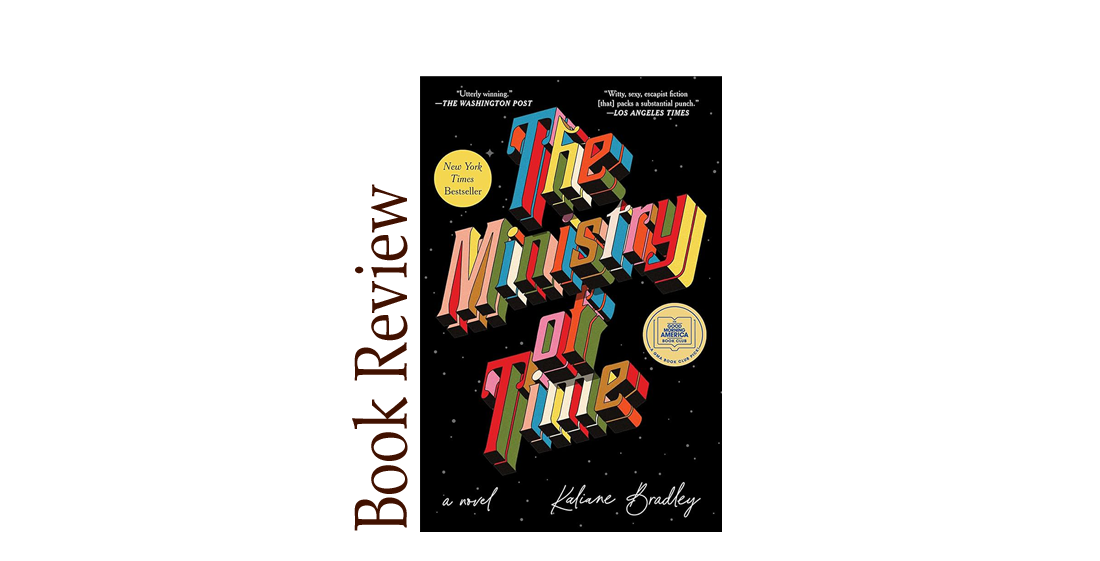- Date Published:
2024 - Length:
352 pages—Listening Time: 10 hr 22 minutes - Genre:
Science Fiction, Romance - Setting:
Some time in the near future; London, England, UK; King William Island, Nunavut, Canada - Awards:
Hugo Award Nominee Novel 2025; Women's Prize for Fiction Longlist 2025; Audie Award Finalist Fiction 2025; Locus Award (Finalist First Novel 2025; Locus Award Finalist Science Fiction Novel 2025; British Book Awards Shortlist Début Book of the Year 2024; Arthur C. Clarke Award Shortlist 2025; Authors' Club First Novel Award Shortlist 2025; Bollinger Everyman Wodehouse Prize for Comic Fiction Shortlist 2024; Australian Book Industry Awards Winner International 2025; Jhalak Prize Longlist Prose 2025; Booklist Editors' Choice: Adult Audio Fiction 2024; Libby Book Award Winner Science Fiction 2025; The Strand’s Favorite Books 2024; The Observer Best Debut Novel 2024; The Morning News Tournament of Books Summer Bracket Shortlist 2025; Climate Fiction Prize Shortlist 2025; Goodreads Choice Awards Winner Science Fiction 2024; Goodreads Choice Awards Nominee Debut Novel 2024; Waterstones Debut Fiction Prize Shortlist 2024 - Languages:
English, German, Italian, Latin, Portuguese - Sensitive Aspects:
Strong language, sexual content, violence, racism, refugee politics, colonial attitudes - Movie:
There is a movie deal for The Ministry of Time. The BBC is adapting the novel into a six-part series. A24 Films will also be involved in producing the series. The adaptation is being written by Alice Birch, known for her work on "Normal People" and "Dead Ringers." The novel was subject to a 21-way auction for film and TV rights. The BBC adaptation was announced in February 2024. - Recommend for Book Club:
Yes, groups that are into science fiction will especially love this book

I'm not particularly a fan of science fiction, so if you are, please indulge me a bit as I attempt to explain why this is a good book. The Ministry of Time by Kaliane Bradley is hard to describe for an ordinary, unscientific lay reader like me. Parts of it were challenging to understand. I often forget where I put my phone, so keeping track of who is who in each time period made it difficult for me to understand what was happening, but I persevered and ultimately enjoyed this book.
And what is not to enjoy? The presentation of time travel in this book is truly remarkable. It is a spy thriller. It is a love story. It makes a strong statement about society and the division of governmental control. This aspect of the book makes it almost dystopian. It's a good book with a strong message.
The premise is alluring. The British government has discovered time travel and established a secretive Ministry to manage it. Instead of sending people to the past, the Ministry brings individuals—called "expats"—from various points in history to the present, selecting those who were about to die in their own times to avoid disrupting the timeline.
If this doesn't interest you, I understand. Finding love on the time continuum isn't for everyone. Go ahead and find your phone, and then click next! But if you're in the least little bit intrigued, continue reading.

The Ministry of Time by Kaliane Bradley is a genre-blending novel set in the near future, where the British government has discovered a door enabling time travel. This leads to the creation of the Ministry of Time, a secretive government agency tasked with extracting individuals from the past—specifically, those who were about to die in their original timelines—to avoid disrupting history. These "expats" are brought to the present and assigned "bridges," civil servants responsible for helping them acclimate to modern life.

The story is narrated by an unnamed British-Cambodian woman, a translator by profession, who becomes a bridge for Commander Graham Gore, a real-life Victorian explorer who perished during the Franklin Arctic expedition in 1847. Other expats include a 17th-century soldier, a survivor of the Great Plague, and a World War I captain, each paired with their own bridge.
As the narrator and Gore navigate their year as roommates, the novel explores the challenges of cultural adaptation, the absurdities and wonders of the modern world, and the growing emotional bond between them, which deepens into a complicated romance. The expats’ reactions to everything from washing machines to changing gender roles provide both humor and poignant commentary on societal progress and historical trauma.
The book gradually shifts from a witty workplace comedy and fish-out-of-water story to a tense thriller. Doubts arise about the true intentions of the Ministry, especially as it becomes clear that the project is shrouded in secrecy and possibly sinister motives. Themes of power, surveillance, imperialism, and the ethics of time travel come to the forefront, especially as the bridges—particularly the narrator and Simellia, another bridge and one of the few people of color in the project—grapple with their roles in a system that echoes colonial dynamics.
The plot builds to a climax involving sabotage, betrayal, and escape. The narrator is ultimately forced out of the Ministry after a series of revelations and dangerous events, including the destruction of the time door and the flight of some expats. The novel ends with the narrator reflecting on her choices and the consequences of meddling with time, writing her story as a warning to her past self—and, by extension, to the reader.
The Ministry of Time is notable for its blend of science fiction, romance, spy thriller, and social satire, using time travel as a lens to examine identity, history, and the complexities of cultural assimilation. The novel has been praised for its sharp wit, emotional depth, and thought-provoking exploration of how individuals and societies confront change and reckon with the past.

If you appreciate smart, genre-defying fiction that’s as entertaining as it is thoughtful, and you enjoy stories that probe the complexities of history, identity, and human connection, The Ministry of Time is highly recommended for you. This book will captivate you if you seek a novel that expertly combines elements of time travel, romance, spy thriller, and literary fiction, while also providing insightful social commentary and profound emotional depth.
Here are the key reasons to read this book:
Genre-Bending Storytelling
The novel is praised for its unique mix of genres—time travel romance, spy thriller, workplace comedy, and literary fiction—so whether you prefer one or all of these, you’ll find something to enjoy.
Compelling Premise
Instead of sending people back in time, the story brings historical figures (“expats”) into the near future. The protagonist, a British-Cambodian civil servant, is assigned as a “bridge” to help acclimate Commander Graham Gore, a doomed Arctic explorer from 1847, to modern London.
Rich Characterization
The relationship between the narrator and Gore evolves from awkward roommates to something much deeper, with their dynamic offering both humor and genuine emotional resonance. Secondary characters, including other time-displaced expats, add further depth and diversity to the cast.
Thought-Provoking Themes
The novel explores identity, power, imperialism, colonialism, trauma, and the sense of belonging. The narrator’s own experience as the daughter of a Cambodian refugee parallels the struggles of the historical expats, raising questions about displacement and adaptation.
Witty and Engaging Prose
Reviewers highlight the book’s sharp dialogue, clever observations, and sparkling wit, making it both entertaining and intellectually stimulating.
Critical Acclaim
The Ministry of Time has appeared on major “Best of the Year” lists and has been recognized for its originality and emotional impact with numerous awards and prizes.



If you enjoyed The Ministry of Time by Kaliane Bradley for its blend of time travel, romance, wit, social commentary, and genre-bending storytelling, here are several books that offer similar themes and reading experiences:
- The Time Traveler’s Wife by Audrey Niffenegger
A modern classic that weaves together romance and time travel, exploring the emotional and existential consequences of loving someone displaced in time. Like Bradley’s novel, it’s as much about relationships as it is about the mechanics of time travel. - This Is How You Lose the Time War by Amal El-Mohtar & Max Gladstone
This epistolary sci-fi novel features two rival time-traveling agents who fall in love across timelines. It’s poetic, witty, and deeply romantic, with a speculative twist reminiscent of Bradley’s genre-blending style. - The Psychology of Time Travel by Kate Mascarenhas
A literary, character-driven take on time travel, featuring multiple female protagonists and a government agency overseeing time travel. It mixes mystery, romance, and social critique, echoing the workplace intrigue and speculative elements of Bradley’s work. - The Seven Husbands of Evelyn Hugo by Taylor Jenkins Reid
While not about time travel, it shares a strong sense of historical figures colliding with the present, complex relationships, and the exploration of identity through different eras. - The First Fifteen Lives of Harry August by Claire North
Focuses on a protagonist who relives his life repeatedly, blending speculative fiction with philosophical questions about fate, agency, and the impact of individual actions on history. - Oona Out of Order by Margarita Montimore
A time-jumping narrative about a woman who wakes up each New Year’s Day in a different year of her life. It’s witty, heartfelt, and explores the dislocation and emotional challenges of living out of sync with time. - To Say Nothing of the Dog by Connie Willis
A comedic and romantic time travel novel with a British sensibility, featuring historians who travel to the past and get caught up in chaos. Its humor and genre play will appeal to fans of Bradley’s lighthearted yet thoughtful approach. - The Future of Another Timeline by Annalee Newitz
A speculative novel with time travel, activism, and a focus on social justice and gender politics, resonating with Bradley’s interest in the intersection of history, identity, and power.


Comments